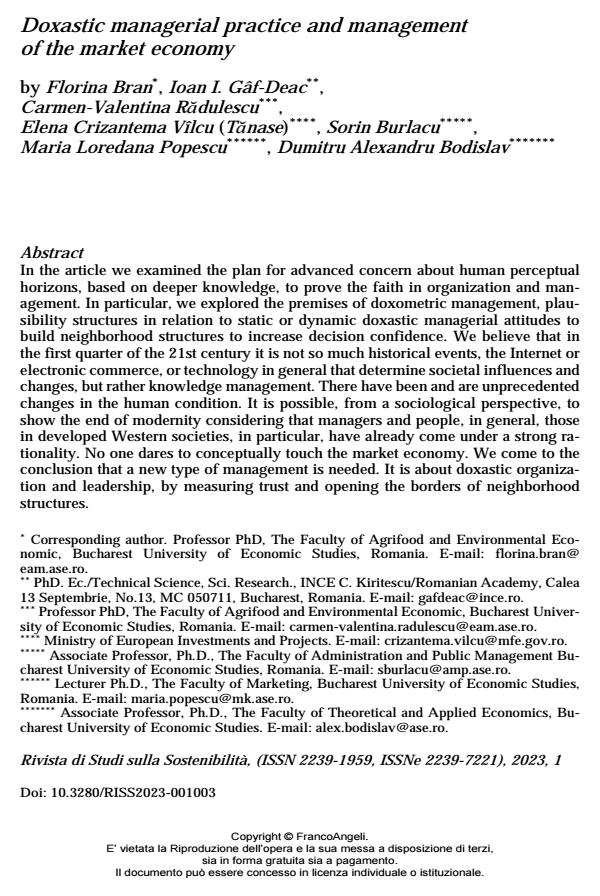Doxastic managerial practice and management of the market economy
Titolo Rivista RIVISTA DI STUDI SULLA SOSTENIBILITA'
Autori/Curatori Florina Bran, Ioan I. Gâf-Deac, Carmen-Valentina Radulescu, Elena Crizantema Vîlcu (Tanase), Sorin Burlacu, Maria Loredana Popescu, Dumitru Alexandru Bodislav
Anno di pubblicazione 2023 Fascicolo 2023/1
Lingua Inglese Numero pagine 34 P. 29-62 Dimensione file 372 KB
DOI 10.3280/RISS2023-001003
Il DOI è il codice a barre della proprietà intellettuale: per saperne di più
clicca qui
Qui sotto puoi vedere in anteprima la prima pagina di questo articolo.
Se questo articolo ti interessa, lo puoi acquistare (e scaricare in formato pdf) seguendo le facili indicazioni per acquistare il download credit. Acquista Download Credits per scaricare questo Articolo in formato PDF

FrancoAngeli è membro della Publishers International Linking Association, Inc (PILA), associazione indipendente e non profit per facilitare (attraverso i servizi tecnologici implementati da CrossRef.org) l’accesso degli studiosi ai contenuti digitali nelle pubblicazioni professionali e scientifiche.
In the article we examined the plan for advanced concern about human perceptu-al horizons, based on deeper knowledge, to prove the faith in organization and management. In particular, we explored the premises of doxometric management, plausibility structures in relation to static or dynamic doxastic managerial attitudes to build neighborhood structures to increase decision confidence. We believe that in the first quarter of the 21st century it is not so much historical events, the Inter-net or electronic commerce, or technology in general that determine societal influ-ences and changes, but rather knowledge management. There have been and are unprecedented changes in the human condition. It is possible, from a sociological perspective, to show the end of modernity considering that managers and people, in general, those in developed Western societies, in particular, have already come under a strong rationality. No one dares to conceptually touch the market econo-my. We come to the conclusion that a new type of management is needed. It is about doxastic organization and leadership, by measuring trust and opening the borders of neighborhood structures.
Parole chiave:belief, doxastic management, neighborhood structures, knowledge manage-ment.
- The Impact of the Geopolitical Situation on Inflation in the Current Period Oana Camelia Iacob Pargaru, Romeo Catalin Cretu, Răzvan Marian Pîrcălăbescu, Daniel Soldan, in Proceedings of the International Conference on Business Excellence /2025 pp.5307
DOI: 10.2478/picbe-2025-0406
Florina Bran, Ioan I. Gâf-Deac, Carmen-Valentina Radulescu, Elena Crizantema Vîlcu (Tanase), Sorin Burlacu, Maria Loredana Popescu, Dumitru Alexandru Bodislav, Doxastic managerial practice and management of the market economy in "RIVISTA DI STUDI SULLA SOSTENIBILITA'" 1/2023, pp 29-62, DOI: 10.3280/RISS2023-001003